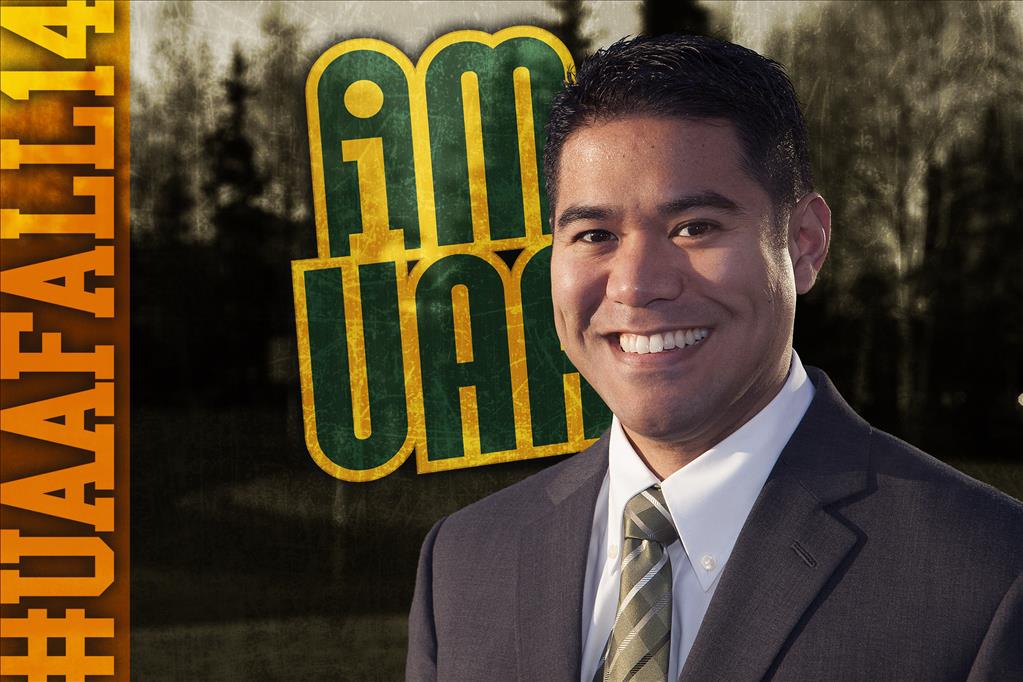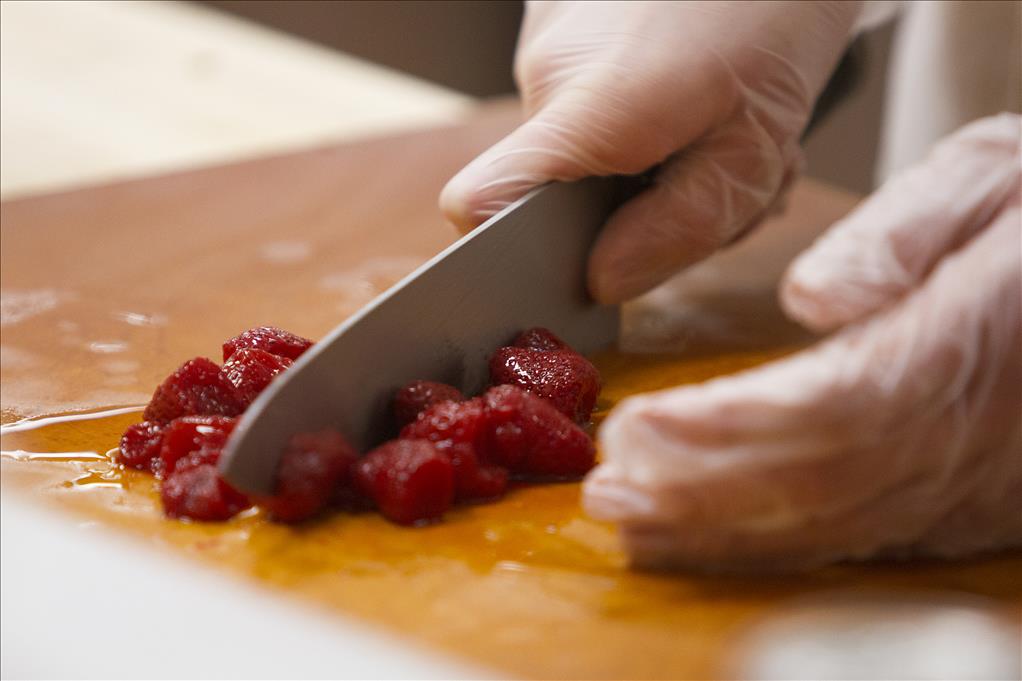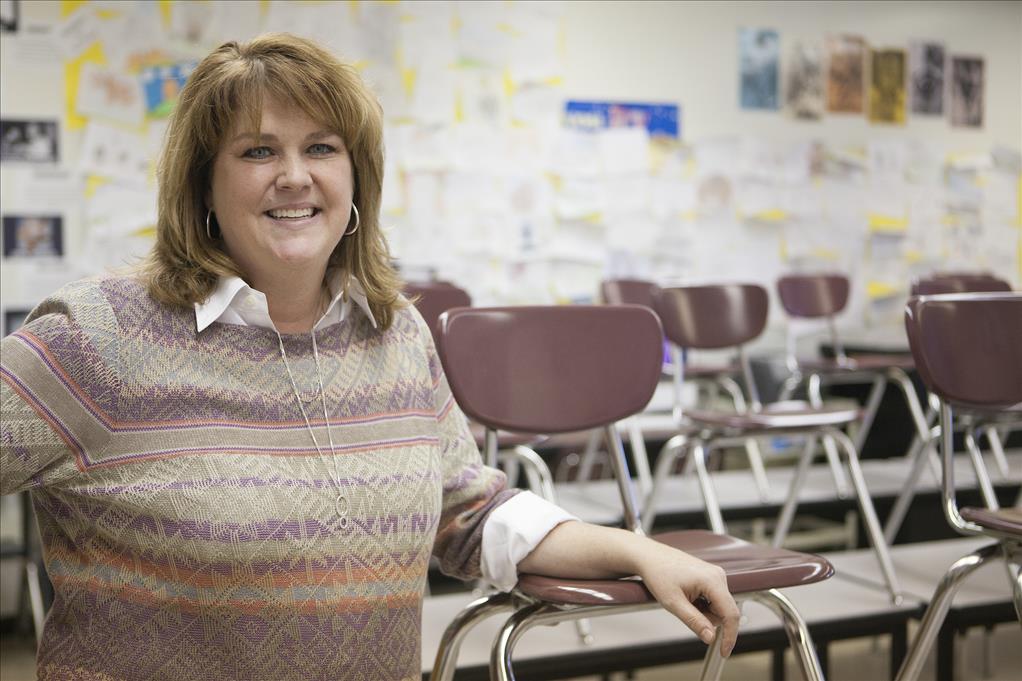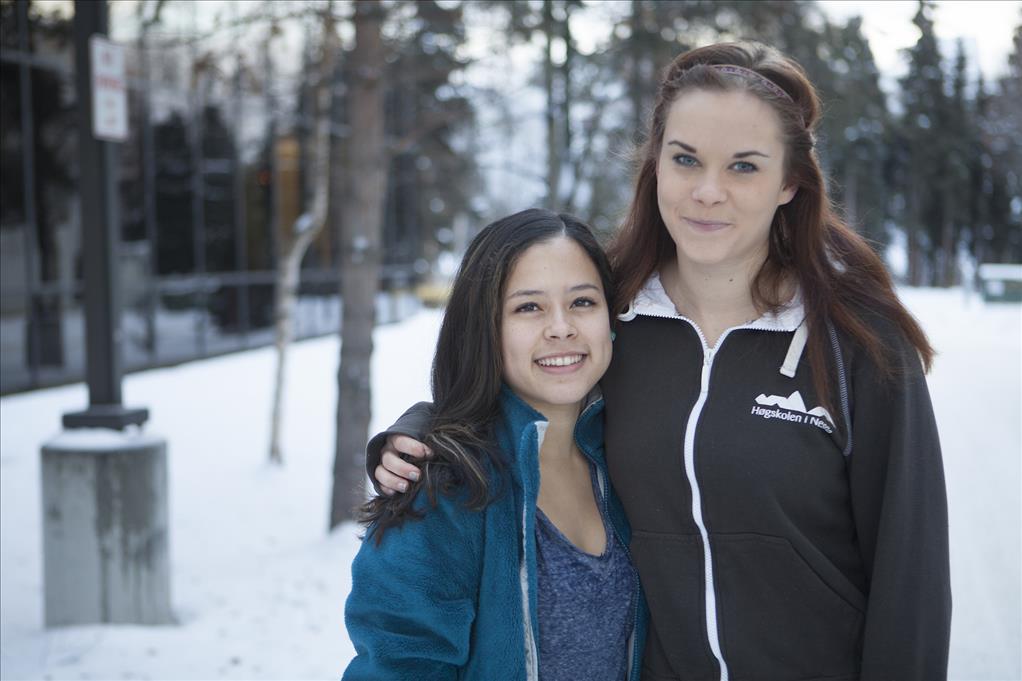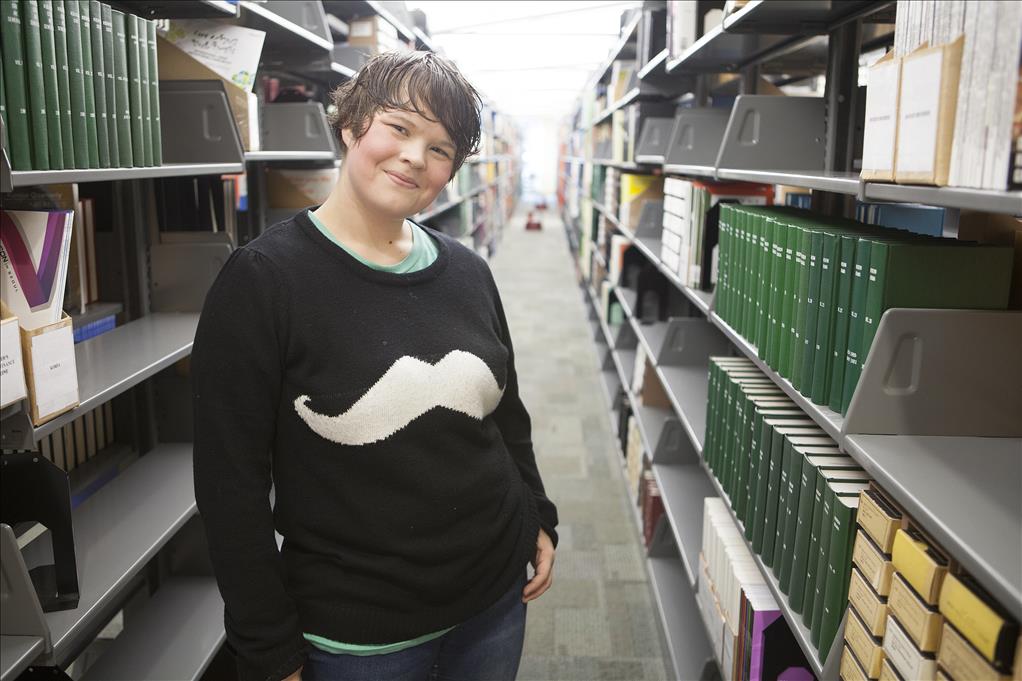Investing in Alaska’s entrepreneurs
by Jamie Gonzales |
Alaska food truck, fat bike and co-working pioneers took to the stage to offer their insights as young entrepreneurs during this month's Entrepreneurial Edge speaker series on Friday, Feb. 21. Individually, the eight speakers have all ventured into uncharted territory in their respective industries and lived to tell the stories. The audience in Rasmuson Hall-students and community members with germinating ideas for new businesses-had their pens and pencils poised to take down their advice.

Al Hermann (College of Business & Public Policy) and Forrest Nabors (College of Arts & Sciences), working to improve the climate for entrepreneurship in Alaska. Philip Hall/University of Alaska Anchorage.
"When you're an entrepreneur, you need to know how to steer across the ocean without a compass or a map because you're the first one, by definition," said Forrest Nabors, an assistant professor of political science at UAA whose background as an entrepreneur led to a connection with UAA's entrepreneurship expert, Al Hermann, and involvement in co-curricular activities to advance entrepreneurship at UAA and in Alaska.
Hermann is a term assistant professor of business administration and founder of the Entrepreneurial Edge events-a collaboration among many community organizations and educators-as well as the man responsible for reinvigorating the Alaska Business Plan Competition a few years ago.
Together, both Hermann and Nabors are passionate about Alaska's potential to produce the kind of creative thinkers who are fearless enough to head out across those uncharted seas as an entrepreneur.
Advice from the front lines of entrepreneurship in Alaska

Paul Clark from Anchorage Community Works and 10up.com addressed a crowd of entrepreneur hopefuls during a Feb. 21 Entrepreneurial Edge speaker series panel discussion. Pictured at left is UAA alumna Brit Szymoniak of The Boardroom. Philip Hall/University of Alaska Anchorage
"Please don't start a business if you want to work less," said Paul Clark, one of the founding members of Anchorage Community Works and a technology pioneer who now works for 10up.com. Vigorous nods of assent came from his fellow panelists.
Also on stage to tell her story was Kathy Robinson, a UAA Culinary Arts alumna who started Wheel Good Food, a food truck company in Anchorage, with her husband.
"We knew food trucks were hot down south," she said. They did their homework, eating their way from food truck to food truck for a week in Los Angeles and peppering the operators with questions. But some of their most valuable knowledge could only be gained from jumping in with both feet right here in Alaska.

Wheel Good Food trucks, a venture started by UAA alumna Kathy Robinson, can be spotted at all the best hot spots around Anchorage. Photo courtesy of Wheel Good Food.
"We learned that operating at 10 below in the Anchorage winter is a little different," she said to some audience chuckles.
Another alumna, Brit Szymoniak, was joined on stage by her business partner, Katherine Jernstrom, who she met through the Alaska Humanities Forum's Leadership Anchorage. Kindred spirits with matching Type A personalities, they said, they knew they wanted to go into business together. The two started The Boardroom, premium co-working office space plus amenities in downtown Anchorage, just seven months ago and they've already met their initial occupancy goals with 45 partners leasing co-working space. Their business is actually home to a lot of Anchorage innovators and entrepreneurs, including some of their peers on stage. Like Robinson, they both addressed making that scary leap from gainfully employed to being out on their own, making up the rules as they go along. One key for partners?
"We trust each other implicitly," said Jernstrom.
"It sounds kind of weird, but a good partnership is kind of like a platonic marriage," said Bill Fleming, an Anchorage athlete with extensive recreation company experience who, with his business partner, Jamey Stull, brought fat bikes to Alaska and eventually started Fatbikes.com and 9:Zero:7, a line of Alaska fat bikes.
Each partner, they agreed, has their strengths and it's best to play to them. For Robinson and her husband, they divide the tasks between the front end menu and food tasks (hers) and the back end social media promotion and business management (his).
"You can't have too many cooks in the kitchen," she said. "Especially in a food truck."
Funded by angels
"About four years ago, we decided instead of just doing the business plan competition, we wanted to do more for both the students and the community when it came to entrepreneurship," said Hermann. "The first thing we pulled off was the entrepreneurship boot camp. It's for both students and community members. People who want to be entrepreneurs, we give them a one-day overview of what it takes and where they can go for more information and support."
Then a couple years ago, after encouraging feedback from participants in the boot camp and its companion event, speed coaching (a little like speed dating, but with business experts), they decided to fold in a speaker series.

Entrepreneurial Edge panelists (left to right) Katherine Jernstrom, Brian McKinnon, Paul Clark and UAA alumna Kathy Robinson. Philip Hall/University of Alaska Anchorage.
The speaker panel on stage on Friday represented more than just the voices of experience, though. The young entrepreneurs were also representative of the kind of talent that Hermann, Nabors and a third partner, Ky Holland, a business professor at Alaska Pacific University, are considering for start-up investment through their newly forming angel investment fund.
"Our view is that what this state has really been missing, the crucial piece of the equation that leads to a diversified, vibrant Alaska economy is professionally managed, third-party investment funds, particularly at the start-up level that are investing in Alaska," said Nabors.
The angel fund-a "cousin" to UAA's Seawolf Venture Fund, said Nabors, though it's not officially controlled by the university like the Seawolf Venture Fund-has received an infusion from the state's 49th State Angel Fund, as well as money from other investors and will begin investing exclusively in Alaska start-up business ventures this year. They also plan to give a percentage of the fund's profits to UAA once the start-ups they invest in start to become profitable.
One of the young entrepreneurs on stage, Brian McKinnon, a past winner of the Alaska Business Plan Competition, has two business ventures on the slate for investment consideration by the fund.
Aknuna Technologies is the company formed around McKinnon's closed fueling system brainchild, sparked by his own near-fatal workplace incident accidentally inhaling atomized fuel.
He connected with Hermann a couple years ago to develop his business plan and refine his ideas. In the meantime, he also developed a second concept and prototype for the "SUV of personal watercraft" that caught the eye of some industry and military professionals and led to formation of his second company, MacKinnon Marine.
With help from Hermann to connect to the right people, McKinnon will be rolling out his watercraft to the public at The Great Alaska Sportsman Show this year.
His closed fueling system is headed for what could potentially be an even bigger market. BP wants the device for use on the North Slope.
"That one has probably the biggest potential of any business, outside of the natural resource industries, I've personally seen in Alaska since I've been here," said Hermann.
"If we capture 1 percent of the U.S. market," McKinnon said, "That would be $1.5 billion in sales."
Nabors and Hermann, both relatively new to Alaska, agreed that there is great entrepreneurial potential in the state. It's what drives them to devote hours outside of the classes they teach, to nurture Alaska's burgeoning entrepreneurial spirit.
And they were quick to point out that co-curricular activities like Entrepreneurial Edge events aren't just for business majors. Take it from an entrepreneurial political scientist.
"Liberal arts students from my college-the College of Arts & Sciences-they make great entrepreneurs," said Nabors. "I know that from experience. When I was in college, I didn't take one pre-professional course. I studied dead languages, philosophy, history and politics."
So, whether you're a literature major, an artist or an engineer, listen up. You just might learn how to take that next leap, follow your dream and, if you believe those who've ventured out before you, work harder than you've ever imagined.
Entrepreneurial Edge is a partnership between the UAA Center for Economic Development, Anchorage Economic Development Corporation, University of Alaska Southeast, Alaska Pacific University, The Entrepreneurs and Mentors Network Inc., UAA College of Business and Public Policy, Alaska Small Business Development Center and University of Alaska Fairbanks. For more information about it, please contact Al Hermann at (907) 786-4145.
Written by Jamie Gonzales, UAA Office of University Advancement.
 "Investing in Alaska’s entrepreneurs" is licensed under a Creative Commons Attribution-NonCommercial 4.0 International License.
"Investing in Alaska’s entrepreneurs" is licensed under a Creative Commons Attribution-NonCommercial 4.0 International License.










